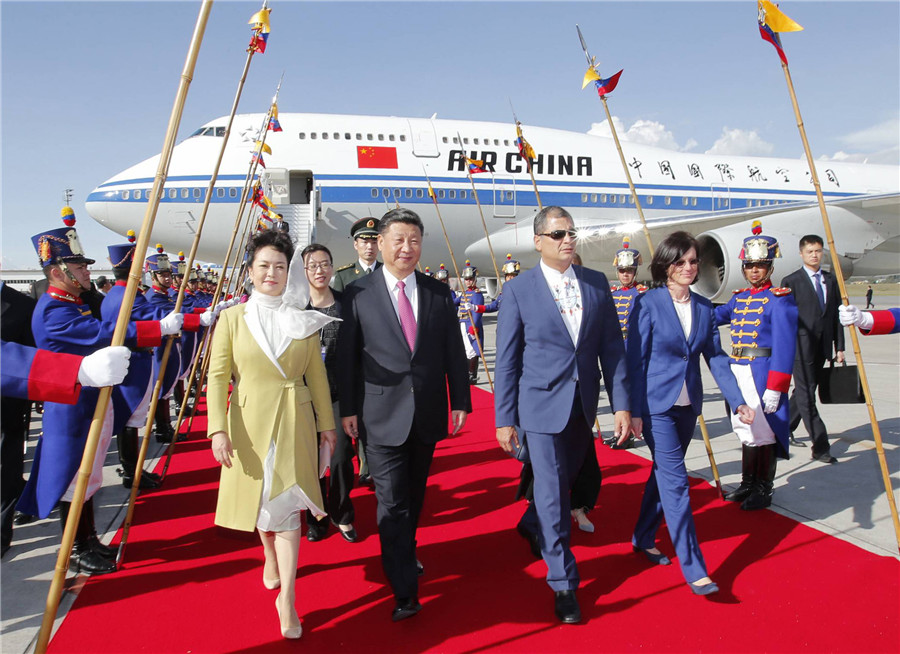Media Report

- Bloomberg reports: "As Donald Trump weighs plans to tear up trade deals and deport illegal migrants from Latin America, Chinese President Xi Jinping is moving swiftly to reset relations in America's backyard. Xi returned from a Latin American swing last week having lavished Ecuador with $10 billion in energy and infrastructure deals, and bestowed Ecuador and Chile with China's highest diplomatic status. He told Peru's Congress relations were 'standing at a new historical starting point.' While attending a summit in Lima with his lame duck U.S. counterpart, Barack Obama, he cast China as the region's most eager trade advocate...Now China finds itself in position to become Latin America's primary growth driver, increasing its chances of surpassing the U.S. as the region's largest trading partner. Trump, meanwhile, is vowing to crack down on immigration from places like Mexico and withdraw the U.S. from the 12-nation Trans-Pacific Partnership free trade pact, which includes Chile, Mexico and Peru."
- The Wall Street Journal comments: "The role of foreign investment in China is greater than Chinese government data suggests, according to one new study. Foreign direct investment, or FDI, in China accounts directly and indirectly for about one-third of China's gross domestic economy and over a quarter of jobs in China, according to 'Developing China: The Remarkable Impact of Foreign Direct Investment,' a study by Michael Enright, a business professor at the University of Hong Kong. More conventional measures put the contribution from foreign companies in single-digit percentages...'Foreign investment has clearly been important here, and there seems to be an increasing tendency to downplay its importance,' [Mr. Enright said in an interview]...China has recently touted its indigenous capabilities and created national strategies such as 'Made In China 2025' aimed at replacing imported goods with local products. Chinese think tanks and academics recently have tended to discount foreign companies' role in the economy, Mr. Enright said."
- The Wall Street Journal reports: "China's central bank has stepped up efforts to drain cash from the country's financial system in the past week, as it seeks to curb excessive borrowing and tame frothy markets...At the same time, the PBOC has been guiding major state-owned banks to restrict their short-term lending to other financial institutions, according to market participants. The scarcity of funds and sharp rise in borrowing costs has contributed to a selloff in China's domestic bond markets, which had thrived in recent months on an abundance of cheap funds available to investors. The yield on 10-year Chinese government bonds rose as high as 3.00% on Friday, its highest point since mid-June. Bond yields rise as their prices fall...'It's all part of the government's broader deleveraging campaign that seeks to put China's high debt level under control. The message is clear: the days of easy money are over,' said Suan Teck Kin, an economist at United Overseas Bank in Singapore."
Calendar
- 2016-12-01 China says new North Korea sanctions not meant to harm 'normal' trade
- 2016-11-30 China military says it's seriously concerned by Japan-South Korea pact
- 2016-11-29 China to clamp down on outbound M&A in war on capital flight
- 2016-11-28 Antibiotic-resistance genes in Beijing’s smog are nothing to worry about, Chinese officials say
- 2016-11-25 Trump will pursue 'regional hegemony' in South China Sea: Chinese academic...
- 2016-11-24 China's Economy Looks Like It's Remaining Stable
- 2016-11-23 China Has Warned of Retaliation if U.S. Levies Tariffs, Commerce Secretary Says
- 2016-11-22 China Touts Its Own Trade Pact as U.S.-Backed One Withers
- 2016-11-21 Recent Developments Surrounding the South China Sea
- 2016-11-20 Xi Meets With Obama, Says U.S. and China at 'Hinge' Moment
News
- The Wall Street Journal China Escalates Efforts to Cool Down Financial System
- Bloomberg China Seizes Opening in U.S. Backyard as Trump Upends Policy
- Reuters China concerned over Taiwan content in U.S. defense bill
- Bloomberg China, Grappling With Trump, Turns to 'Old Friend' Kissinger
- The Financial Times China capital curbs sow doubt over renminbi ambitions
- The Associated Press Xi Tells Kissinger China Wants 'Stable' Progress With US
- The New York Times In China, Eugenics Determines Who Plays in School Bands
- The Associated Press China rescues 2 Filipino fishermen at disputed shoal
- The Financial Times China exonerates executed man in landmark case
- BBC China and the Church: The 'outlaw' do-it-yourself bishop
- The Guardian Joy as China shelves plans to dam 'angry river'
- The New York Times China Warns U.S. Against Blocking Aixtron Takeover
- Reuters Germany says receiving growing protectionism complaints in China
Commentary
- The Wall Street Journal: China Real Time Report Study Emphasizes Foreign Investment's Role in Chinese Economy
- Fortune Here's What We Now Know About China's Capital Outflow Controls
- Quartz China's second most powerful man warns of dissent and corruption in the Communist Party
- The Wall Street Journal Coal Price Politics, China Edition
- The Diplomat US-Japan-South Korea Trilateral Cooperation Hangs in the Balance
- Center for Strategic International Studies How does education in China compare with other countries?
- Foreign Policy Breitbart Has Landed in Beijing
